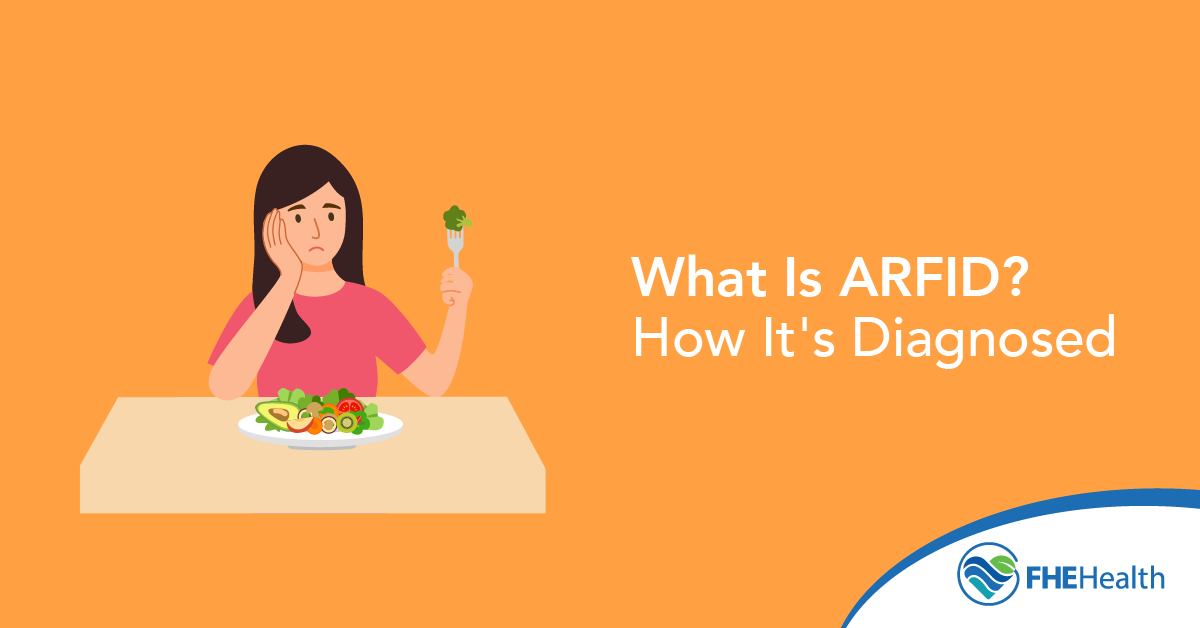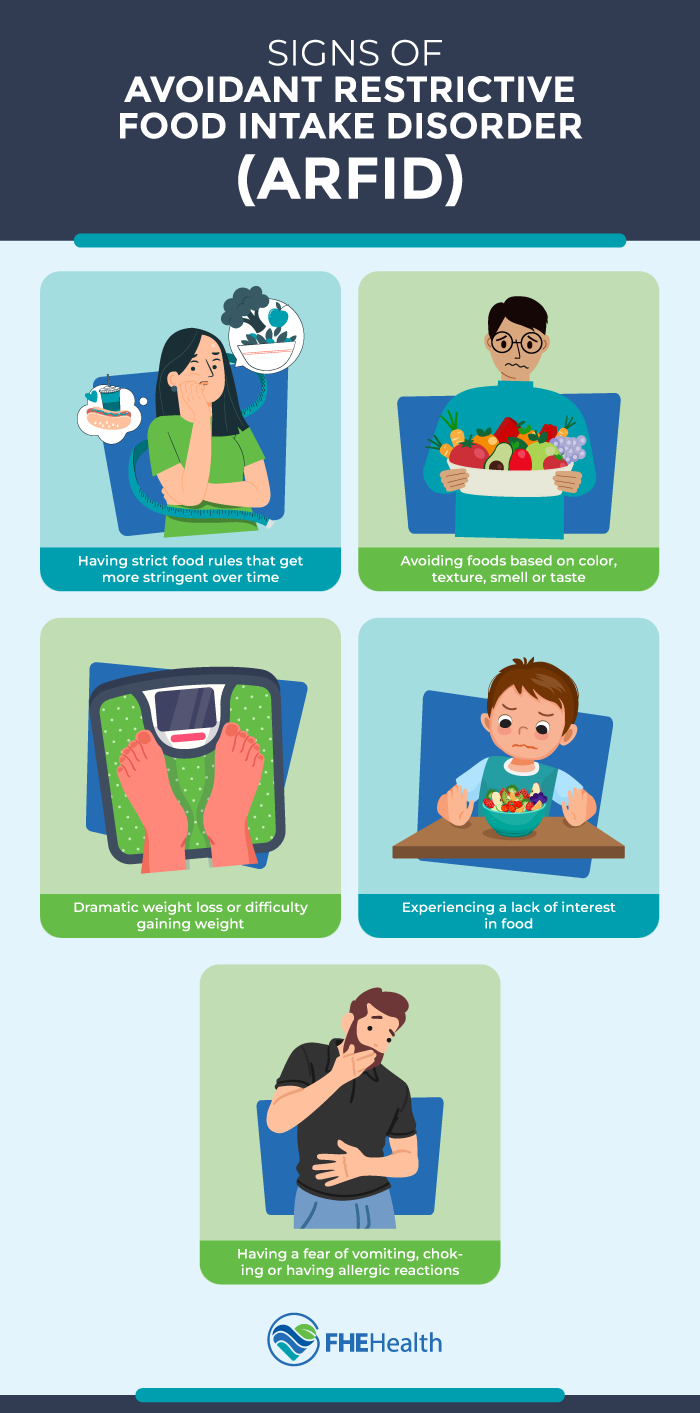
Many children are picky eaters, with specific rules about what they’ll eat and how their food must be served. As they age, most children grow out of these restrictive habits. However, some hold onto restrictive food tendencies and even see them intensify with age. Sometimes these tendencies are so extreme that they develop into an eating disorder diagnosis called avoidant restrictive food intake disorder.
What Is Avoidant Restrictive Food Intake Disorder?
As the name implies, ARFID occurs when an individual has extremely particular preferences and beliefs about food. Their attitudes toward food usually result in them limiting the volume or variety of foods they consume.
ARFID is a relatively new term; it was added to the DSM-5 in 2013 as a formal diagnosis. Previously, psychologists referred to this condition as “Feeding Disorder of Infancy or Early Childhood.” Usually, ARFID presents itself in childhood and may resolve before adulthood. However, ARFID can affect children or adults and can develop at any age.
While ARFID falls into the eating disorder category, it’s quite different from other EDs. People with ARFID don’t tie their food habits to feelings about their body image. Instead, the root of the problem for individuals with ARFID is that they:
- Are generally disinterested in food and eating
- Have sensory issues that get triggered when eating (aversion to strong tastes, textures or smells)
- Are scared of the potential consequences of eating, such as choking, vomiting or having an allergic reaction
It’s estimated that 0.5%-5% of people have the disorder. However, this may be an underestimation since it’s a relatively new DSM-5 diagnosis.

ARFID Symptoms
ARFID doesn’t just appear overnight. It usually starts slowly and intensifies with time.
Warning signs and symptoms of ARFID to watch out for in an individual include:
- Displaying extreme pickiness regarding what foods they eat
- Refusing to try new foods
- Experiencing apparent panic and anxiety when presented with “fear” foods
- Having difficulty gaining weight and meeting growth milestones
- Experiencing possible dramatic weight loss
- Having to use a feeding tube or take lots of supplements to make up for nutritional deficiencies (in drastic situations)
- Gagging or vomiting when trying certain foods
- Experiencing a lack of appetite
- Experiencing a lack of interest in food
- Consuming small portions
- Having digestive complaints around mealtimes (such as having an upset stomach, already being full or having stomach pains)
- Having strict food rules that get more stringent over time
- Eliminating foods based on color, texture, smell or taste
- Having a fear of vomiting, choking or having allergic reactions
- Wearing layers to hide weight loss
Common Causes of ARFID
ARFID hasn’t been extensively studied, but some causes and risks have been associated with the disorder.
- Boys have a higher risk of developing ARFID than girls.
- Children who can’t outgrow their picky eating or have severely picky eating habits can develop ARFID.
- ARFID can be a co-occurring condition. Individuals with autism, ADHD, anxiety and depression are at risk for ARFID.
- People who have issues that make eating uncomfortable, such as digestive issues or severe allergies, can develop ARFID.
The Risks of Having ARFID
Eating disorders can often have serious consequences, and ARFID is no exception. Potential risks for someone with ARFID include:
- Possible dramatic and severe weight loss
- Nutritional deficiency
- Slow or irregular heartbeat
- Low blood pressure
- Loss of a menstrual cycle and fertility issues in women
- Hormonal changes
- Hair loss
- Constipation and gastrointestinal issues
- Lethargy
- Developmental delays
- Anxiety
- Food-related panic attacks
Over time, someone with ARFID may become so malnourished that they require lots of supplements, a feeding tube or both.
The impact of ARFID on the individual depends on how the condition presents. Those who limit the quantity of food they eat will likely experience dramatic weight loss. Conversely, those who restrict their intake to specific foods are more susceptible to nutritional deficiency due to their limited diet.
How ARFID Is Diagnosed: Tools and Assessments
The DSM-5’s diagnostic criteria for ARFID states:
- The person experiences disturbed eating that has resulted in any of the following:
- Nutritional deficiency from not eating enough
- Weight loss in adults and a lack of proper weight gain in children
- Decline in psychosocial function
- Needing to take supplements to meet nutritional requirements
- The disturbed eating isn’t caused by a reasonable factor, such as limited access to food.
- The person isn’t limiting or restricting their food intake due to body image issues.
- The disturbed eating isn’t due to an external physical or mental illness.
Treatment Approaches for ARFID: Pathways to Recovery
ARFID is an eating disorder — someone with ARFID isn’t just picky or particular. Their disorder isn’t a choice; it’s a mental health condition that requires understanding and proper treatment.
Eating disorders are serious mental health disorders that often tend to intensify if no intervention occurs. Someone with ARFID needs professional treatment. Cognitive behavioral therapy is the most common treatment plan for ARFID. With CBT, the individual can learn more about their condition, understand their triggers and learn coping mechanisms.
ARFID is very common in children, and this is when the condition can be the most dangerous. Children can stop gaining weight and experience developmental delays, which can have long-lasting effects.
There’s no “waiting to see” when it comes to eating disorders. Treatment is essential and needs to be immediate.
It can be helpful for the parents of a child dealing with ARFID to seek therapy, too. They may want to learn how to support and empower their child in recovery.
No medications are available to treat ARFID. In some severe cases, individuals must be admitted to a hospital to receive a feeding tube and treatment for health complications.
The good news? Eating disorders are treatable. Individuals with EDs often require a rallying of support from those around them. With the help of a therapist and supportive family members, recovery is possible.
Eating Disorder Treatment at FHE Health
Food doesn’t have to have power over you. At FHE Health, our experienced and compassionate counselors help you take back control of your life. Contact us today to learn more about our mental health treatment programs. Help is just a phone call away.






